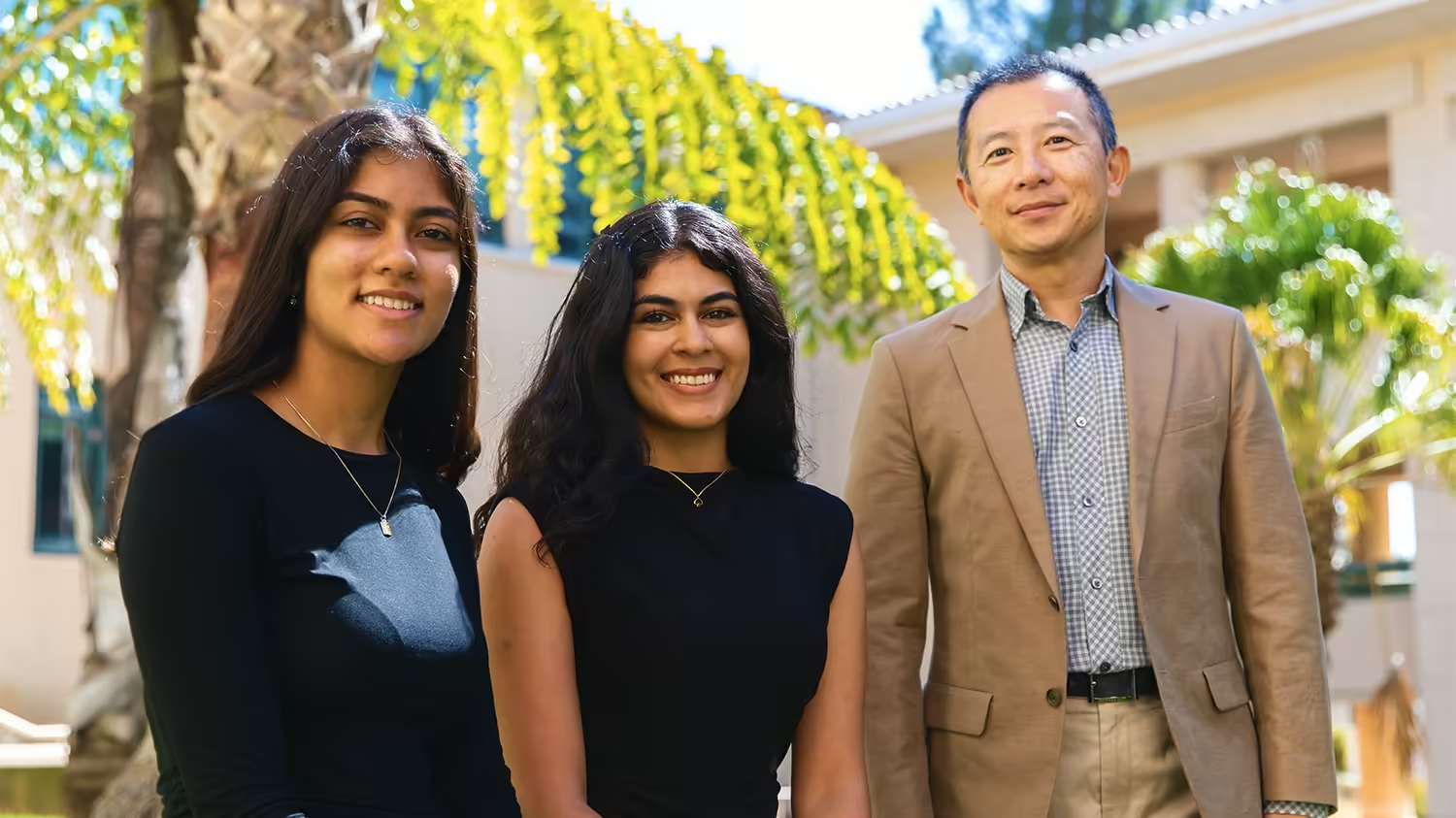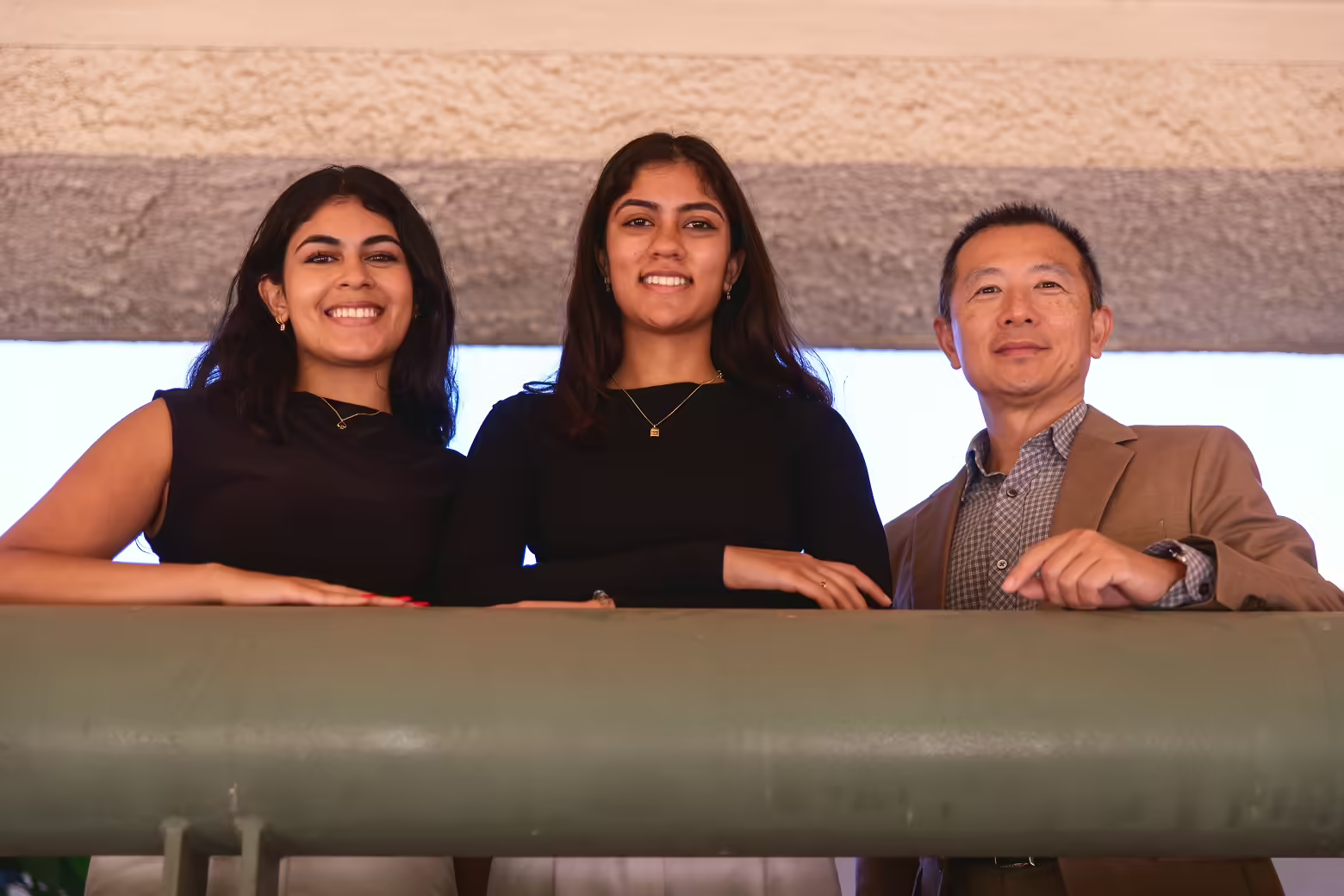“Technostressed” Out: Research Team Explores Why Some Might Avoid Artificial Intelligence in the Workplace

Leida Chen, chair of the Management, HR and Information Systems Area, researched artificial intelligence with two students, sisters Tanya and Soumya Bakshi., during the Summer Undergraduate Research Program (Photo/Jahan Ramezani)
Fear of artificial intelligence can cause workers to avoid the potentially useful technology, according to research conducted during the Summer Undergraduate Research Program (SURP).
The project, led by Leida Chen, chair of the Management, HR and Information Systems Area, explores how generative AI (GAI) contributes to a phenomenon known as technostress.
“Technostress is defined as stress due to the use of information and communication technologies,” Chen said. “It has five main dimensions: techno-overload, techno-invasion, techno-complexity. techno-insecurity, and techno-uncertainty.”
At the workplace, he added, technostress can negatively impact job satisfaction, productivity, and well-being.
While the concept of technostress has been explored elsewhere, there’s little research focusing on how generative AI contributes to it, Chen said. Generative AI is machine learning that uses prompts to create content, including text, images, video and audio.
Chen specifically set out to investigate the adoption of GAI through the lens of behavioral reasoning theory (BRT), which seeks to explain the motives behind human behavior. The project, which he eventually hopes to publish after further research, has included assistance from sisters Soumya and Tanya Bakshi, both business students who are participating in the SURP.
Students who take part in SURP are paired with faculty mentors to conduct real-world, relevant research. Given the rapid proliferation of AI – with more growth likely — Chen’s project represents research on a hot topic.
“I think AI will continue to expand in areas such as healthcare; art and music industries; safety and governance; and environmental stability,” said Tanya Bakshi, a business administration major considering an information systems concentration. “AI will evolve in automating repetitive tasks, and soon it will enhance human-like interactions to give personalized care and support.”

The Summer Undergraduate Research Program pairs undergraduate students with faculty mentors to work on relevant research. One SURP team from this past year was, left to right, Soumya Bakshi, Tanya Bakshi and Leida Chen. (Photo/Jahan Ramezani)
The business community already uses GAI for many functions, including data analytics; content creation; workflow management; customer service; coding and cybersecurity. Yet, there are legitimate fears about its negative potential.
“AI is still a relatively new topic, and it is essential to research it to understand its potential impact,” Tanya Bakshi said. “AI is becoming more and more integrated into our everyday lives, so it is important to address concerns of privacy, ethics, and job displacement early on.”
Chen specifically set out to investigate the adoption of GAI through the lens of behavioral reasoning theory (BRT), which seeks to explain the motives behind human behavior. As with other new technologies, GAI can also lead to feelings of being overwhelmed, said Soumya Bakshi, an industrial technology & packaging student.
“As AI becomes more popular and integrated into everyday spaces, technostress can increase because of the quick changes and the need for continued learning,” she said. “This, therefore, leads to resistance or anxiety among users, impacting its adoption and want to use AI tools.”
Chen’s research might examine how reasoning influences the extent of GAI use at work.
“For instance, why some individuals justify continued and extensive GAI use despite stressors, while others opt out, could be explored,” he said. “The understanding will help design better interventions and guide ethical and responsible use of GAI.”
One obvious goal of technostress entails reducing it.
“Based on existing research, coping mechanisms, including technology literacy, organizational support, and adaptive learning strategies, are identified as critical in mitigating technostress effects,” he said.
The SURP research is a pilot, Chen said, and he expects his research to expand, leading to sharing it at conferences and academic journals. Meanwhile, the current summer project allows students an opportunity to develop skills related to critical thinking, research methodology, and data analysis.
“Working as a researcher helps strengthen my analytical and comprehension skills, both of which I believe are extremely important for any future career,” said Soumya Bakshi, who is currently working as a program management intern at Oracle, where she collaborates with team members to analyze business inefficiencies and find solutions. “Working on this GenAI research topic, I have learned a lot about different types of artificial intelligence products and what tech companies are doing to stay ahead of their competitors.”
By supporting programs like SURP, you can help prepare our students to become Day One Ready for their careers once they graduate. Please support the Dean’s Excellence Fund, which supports SURP.
